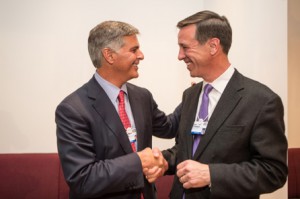DAVOS, Switzerland -?Two hospitality giants -?Hilton Worldwide?and?Marriott International?- addressed global business and travel industry leaders today at the World Economic Forum in Davos to urge governments to move quickly to adopt “Smart Visa” policies which stimulate global travel, create new jobs and spur economic development. The two companies represent more than 7,000 hotels in 90 countries, which include 600,000 employees at these owned, managed and franchised properties.? They are working together with the World Economic Forum Governors for the aviation, travel and tourism industry to promote global action toward “Smart Visa” policies regionally by 2015 and globally by 2020.
Smart Visas refer to safe, secure and sustainable solutions that promote mobility, maximize the use of technology, and expand programs that facilitate travel while removing process inefficiencies caused by arduous visa requirements. As a result of Smart Visa policies, more data is collected and shared across borders, creating enhanced security, efficiencies that reduce government spending and a better customer experience.
[quote]”In 2012, the UN World Tourism Organization reported that more than one billion people traveled outside their borders – a tremendous catalyst for global commerce and new jobs,” said Christopher J. Nassetta, president and CEO, Hilton Worldwide. “We are here at the World Economic Forum to tackle complex and challenging economic, social, environmental and political issues. Enabling greater international travel is the low-hanging fruit that can create significant economic growth and employment.”[/quote]

[quote]”Smart governments are thinking about international travel and tourism as trade, and they are doing everything they can to remove barriers and be more strategic in addressing visas and other access issues that discourage people from traveling and doing business,” said Arne Sorenson, president and CEO, Marriott International. “While we recognize that security remains a top concern, we call on the world leaders here at Davos to be visionary about a future world of interconnected markets where moving people more easily will allow more people to see the world and result in two billion world travelers by 2050.”[/quote]
Many countries are recognizing the economic benefits of international travel and tourism and making secure and convenient travel a policy priority, including Turkey, which has doubled international visitation by providing visas on arrival; China, which has implemented visa-free travel for three days to Beijing for 45 countries; Russia, which is encouraging visa-free travel to and from the European Union; and Australia and the United Arab Emirates, which have been utilizing electronic visas, where the process is on-line and takes minutes, not days or weeks. The ASEAN nations are moving to a common regional visa to promote economic development.
In the year since U.S. President Barack Obama announced the development of the country’s first ever national travel and tourism strategy, the United States has made significant progress. International arrivals increased after the visa waiver program was expanded to Taiwan and South Korea and wait times for in-person interviews, most notably in China, Brazil, and Mexico, were brought down to under one week.
“We applaud those governments who are taking visionary approaches to facilitating travel, enhancing economies and providing employment opportunities worldwide.? We view the private sector and Forum leaders as powerful partners to ensure progress continues so that global visa and entry policies are augmenting and enhancing the free-flow of goods, services, and people,” said Nassetta and Sorenson.
According to the recent White House travel and tourism progress report, the hospitality industry contributed $1.4 trillion in economic activity in the U.S. and 7.5 million jobs in 2011. Hilton Worldwide reports that Chinese travelers to their hotels in the U.S. increased by 60 percent last year, and Brazilian travelers by 10 percent, due in part to visa access improvements.
Globally, at $6.3 trillion in 2011, or 9.1% of total worldwide GDP, travel and tourism contributes more to world economies than some of the largest manufacturing sectors, including automotive and chemicals. The industry directly employs 98 million people, according to the World Travel and Tourism Council.
[box]About Marriott International
Marriott International, Inc. (NYSE: MAR) is a leading lodging company based in Bethesda, Maryland, USA with more than 3,700 properties in 74 countries and territories and reported revenues of over $12 billion in fiscal year 2011. The company operates and franchises hotels and licenses vacation ownership resorts under 18 brands, including Marriott Hotels & Resorts, The Ritz-Carlton, JW Marriott, Bulgari, EDITION, Renaissance, Gaylord Hotels, Autograph Collection, AC Hotels by Marriott, Courtyard, Fairfield Inn & Suites, SpringHill Suites, Residence Inn, TownePlace Suites, Marriott Executive Apartments, Marriott Vacation Club, Grand Residences by Marriott, and The Ritz-Carlton Destination Club. There are approximately 300,000 employees at headquarters, managed and franchised properties. Marriott is consistently recognized as a top employer and for its superior business operations, which it conducts based on five core values: put people first, pursue excellence, embrace change, act with integrity, and serve our world.[/box]

